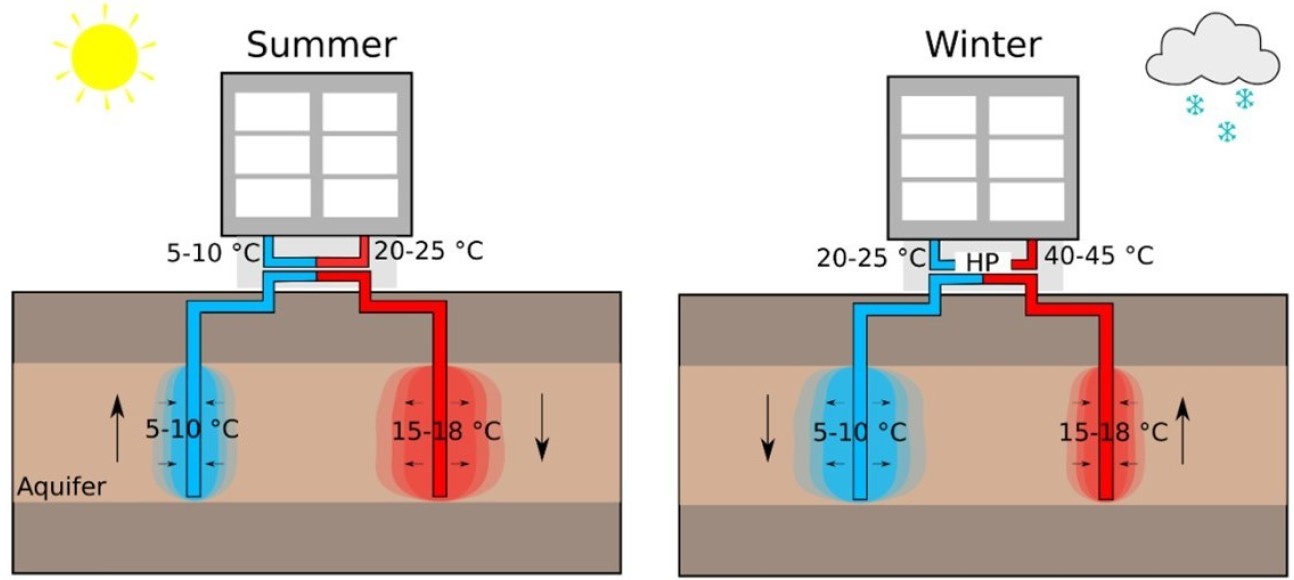
A collaborative research project between Imperial College London, the British Geological Survey and the University of Manchester
Aquifer thermal energy storage for decarbonisation of heating and cooling: Overcoming technical, economic and societal barriers to UK deployment (ATESHAC)
Providing low carbon heating and cooling for buildings is a key challenge in moving to a net-zero economy. Aquifer Thermal Energy Storage (ATES) is a type of geothermal seasonal energy storage that can deliver heating and cooling to large buildings, and heating/cooling networks, with very high energy efficiency and very low carbon emissions. ATES recycles surplus heat and cool from buildings that would otherwise be wasted.

Typical ATES deployment using a well doublet. In summer (left), cool water is pumped out of the aquifer to provide space cooling, and warm water is pumped into the aquifer to store heat for use in winter. In winter (right), the system is reversed and operated with a heat pump: warm water is pumped out of the aquifer to provide space heating, and cool water is pumped into the aquifer to store cool for use in summer.
ATES is a key candidate technology for large-scale decarbonisation of heating and cooling in the UK, because the climate is seasonal and there are suitable aquifers beneath numerous large urban and industrial centres. However, uptake of ATES in the UK is low, with just a handful of projects in a few locations. In contrast, Holland has more than 2500 operational installations.
The broad aim of the ATESHAC project is to overcome technical, economic and societal barriers to large-scale deployment of ATES in the UK and other immature markets, by providing key data, knowledge and recommendations targeted at
- Industry, to raise awareness and reduce perceived technical and economic risks
- Government, to guide policy and stimulate uptake
- Regulatory authorities, to inform a fit-for-purpose regulatory framework
ATESHAC is a collaborative, multi-disciplinary project, involving researchers from the Department of Earth Science and Engineering, The Energy Futures Lab, and the Centre for Envionmental Policy at Imperial College London; the British Geological Survey, and the Department of Earth and Environmental Sciences at the University of Manchester.
ATESHAC links
Project partners
ATESHAC is supported by seventeen project partners who supply expert advice and guidance, provide key data, and a route to disseminate results direct to stakeholders. If you would like to become a partner on the project, please let us know.
- The UK Department of Energy Security and Next Zero (DESNZ) develops national and local policy pertaining to low carbon heating and cooling technology such as ATES
- The UK Environment Agency develops and applies the regulatory framework for ATES
- Mott MacDonald leads commercial development of ATES in the UK and internationally
- IFTech leads commercial development of ATES in the UK and internationally
- Genius Energy Lab design Ground Source Heat Pump installations and Heat Networks including several UK ATES deployments
- Carbon Zero Consulting provide expert advice on Ground Source Heating and Cooling systems
- Bring Energy deliver sustainable heating and cooling across city-scale networks
- The Association for Decentralised Energy drives the decarbonisation of heat
- On Site Energy delivers lower cost and carbon emissions for energy intensive industry
- SSE is a major energy supplier and operates ATES systems in the UK
- Storengy has broad interest in energy storage in the UK and internationally
- HayesTec leads on district heating installations
- National Grid ESO supports analysis of ATES in an energy network context
- The UK Heat Pump Federation informs policy and works to raise awareness of heat pump technology
- The UK Ground Source Heat Pump Association (GSHPA) informs policy and uses results to improve best practice and update relevant code(s)
- THE UK Chartered Institute of Building Service Engineers (CIBSE) uses results to improve best practice and update relevant code(s)
- The Geological Survey of Northern Ireland confirm UK-wide engagement and applicability
Funding
ATESHAC is funded by the UK Engineering and Physical Sciences Research Council (grant number EP/V041878/1). ATESHAC was funded as one of eleven projects under a specific call for new technology solutions to decarbonize heating and cooling (see www.ukri.org/news/eleven-projects-launched-to-decarbonise-heating-and-cooling/).
News
We are pleased to share news of the most recent paper from ATESHAC: Aquifer Thermal Energy Storage for low carbon heating and cooling in the United Kingdom: Current status and future prospects, Applied Energy 376, 124096, 2024. Results from the paper were featured in an article in the i newspaper: How underground reservoirs could be the future of cheaper heating bills.
Contact us
The project lead, Professor Matthew Jackson, can be contacted at m.d.jackson@imperial.ac.uk.